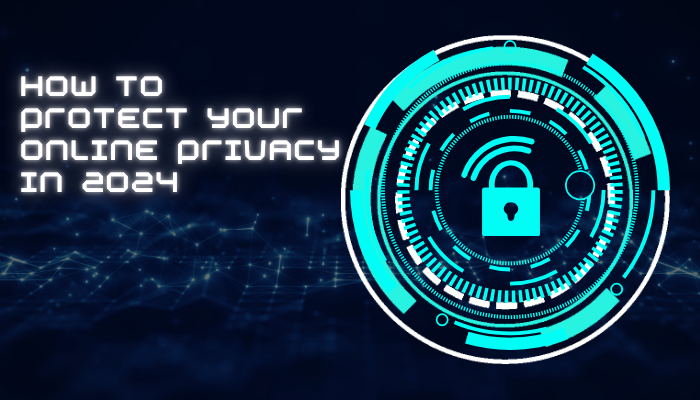In an increasingly digital world, protecting your online privacy has never been more critical. As technology advances, so do the methods used by cybercriminals, advertisers, and even governments to track your online activities. Whether it’s safeguarding personal data, avoiding surveillance, or maintaining anonymity, understanding how to protect your online privacy in 2024 is essential. This guide will cover practical steps you can take to enhance your online security and keep your information safe.

1. Use Strong, Unique Passwords
Creating strong, unique passwords for each of your online accounts is the first line of defense against unauthorized access. A weak or reused password can make it easy for hackers to breach multiple accounts if just one is compromised.
- Tips for Strong Passwords:
- Use at least 12 characters, including letters, numbers, and symbols.
- Avoid common words, phrases, or easily guessable information like birthdays.
- Consider using a passphrase—a random combination of words that is easy for you to remember but hard for others to guess.
- Tools:
- Use a password manager like LastPass, Dashlane, or Bitwarden to generate and store strong passwords securely.
2. Enable Two-Factor Authentication (2FA)
Two-factor authentication (2FA) adds an extra layer of security by requiring a second form of verification in addition to your password. Even if someone manages to steal your password, they won’t be able to access your account without the second factor.
- Types of 2FA:
- SMS-based 2FA: A code is sent to your phone via text message.
- Authenticator apps: Use apps like Google Authenticator or Authy to generate time-based codes.
- Hardware tokens: Devices like YubiKey provide physical authentication.
3. Use a Virtual Private Network (VPN)
A Virtual Private Network (VPN) encrypts your internet connection, making it difficult for third parties to track your online activities or intercept your data. A VPN also masks your IP address, providing a layer of anonymity when browsing the web.
- Benefits:
- Encrypts your data, protecting it from hackers on public Wi-Fi networks.
- Hides your IP address, making it harder for websites to track your location.
- Bypasses geo-restrictions and censorship in some regions.
- Recommended VPNs:
- NordVPN, ExpressVPN, and CyberGhost are popular choices with strong security features.
4. Be Cautious with Social Media Sharing
Social media platforms are treasure troves of personal information, making them prime targets for data mining and cyberattacks. Be mindful of what you share online, and review your privacy settings regularly to control who can see your information.
- Tips:
- Limit the amount of personal information you share publicly.
- Use privacy settings to restrict access to your posts and profile details.
- Be wary of third-party apps and quizzes that request access to your social media accounts.
5. Regularly Update Your Software
Outdated software is a common entry point for cyberattacks. Regularly updating your operating system, applications, and security software ensures that you have the latest protections against vulnerabilities.
- Best Practices:
- Enable automatic updates for your operating system and applications.
- Regularly update your browser and any plugins or extensions you use.
- Install a reliable antivirus program and keep it up to date.
6. Limit Data Collection and Tracking
Many websites and apps track your online behavior to serve personalized ads. While some level of tracking is unavoidable, you can take steps to limit the amount of data that is collected about you.
- Tips:
- Use browser extensions like uBlock Origin or Privacy Badger to block trackers and ads.
- Adjust privacy settings in your browser to block third-party cookies.
- Use search engines like DuckDuckGo that do not track your searches.
7. Be Wary of Phishing Scams
Phishing scams are increasingly sophisticated, with attackers using emails, texts, and phone calls to trick you into revealing personal information or downloading malicious software. Always be skeptical of unsolicited communications and double-check the authenticity before taking any action.
- How to Spot Phishing:
- Look for misspellings, poor grammar, or suspicious URLs in emails and messages.
- Verify the sender’s email address by hovering over it before clicking any links.
- Avoid clicking on links or downloading attachments from unknown sources.
8. Use Encrypted Messaging Apps
Standard text messages are not encrypted, making them vulnerable to interception. Encrypted messaging apps ensure that only you and the intended recipient can read your messages.
- Recommended Apps:
- Signal: End-to-end encryption, open-source, and highly secure.
- WhatsApp: End-to-end encryption, but owned by Meta, which may raise privacy concerns for some.
- Telegram: Offers encrypted messaging, though only in secret chats by default.
9. Manage Your Digital Footprint
Your digital footprint is the trail of data you leave behind when you use the internet. Managing this footprint involves being aware of what information is out there about you and taking steps to remove or protect it.
- Tips:
- Google yourself to see what information is publicly available and take steps to remove anything you’re uncomfortable with.
- Use services like DeleteMe or Jumbo to help remove personal information from data brokers.
- Regularly review and delete old accounts or unused apps that may still have your data.
10. Educate Yourself and Stay Informed
The online privacy landscape is constantly evolving, with new threats and technologies emerging regularly. Staying informed about the latest developments in online security can help you protect yourself more effectively.
- Resources:
- Follow reputable cybersecurity blogs and websites like Krebs on Security, The Hacker News, or Naked Security.
- Participate in online privacy forums and communities to share knowledge and tips.
- Take online courses or attend webinars on cybersecurity to deepen your understanding.
Conclusion
In 2024, protecting your online privacy requires a proactive approach. By following the steps outlined in this guide, you can significantly reduce your risk of being tracked, hacked, or exploited online. Remember, your privacy is in your hands—stay vigilant, use the right tools, and keep up with the latest security practices to ensure that your personal information remains secure.
Stay tuned to our blog for more tips and advice on safeguarding your digital life!


